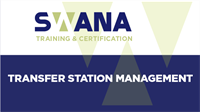Questions About Certification?
Get and Stay Certified




SWANA Certification: Professionalism, Recognition, Knowledge, Achievement, Leadership
SWANA certification is recognized by numerous states as the standard for solid waste employees.
Whether you’re just starting the journey or well on the path of becoming successful in the solid waste profession, SWANA Certification is your guide to career enhancement, increased salary, and greater success in your chosen discipline.
SWANA credentials are earned through education, experience, and challenging program of examinations and maintained through continuous review and education.
Please review the experience requirements closely for the discipline(s) in which you seek certification. If you do not have the requisite experience, your application will be denied.
Certification Information
Certification empowers you with the latest information, creates networking opportunities with fellow professionals, and identifies you as an asset to the industry.
Ready to Get Certified?
Visit our Become Certified page and follow three easy steps to register for certification.
- Login or create a SWANA account
- Apply for certification online
- Register for online testing
Application Costs*
Members: $250.00
Non-members: $400.00
* Certification and recertification fees do NOT cover your SWANA membership fees.
Learn More About SWANA Certification Disciplines
Transfer Station Management (US Version)

Prepare for the Inevitable
The Transfer Station Management (TSM-US Version) course addresses factors in planning, design, operation, and management of a transfer station. You will learn how a well-planned, designed and operated transfer station provides advantages and flexibility to a waste management system. Discussion of how effective communication with the public and regulators helps mitigate challenges in planning and operating a transfer station, and how planning and design affect construction and operation.
Course Objectives
After completing this course, learners should be able to:
- Understand and discuss the steps, factors, and local requirements in site selection and development and conceptual design
- Describe site-specific characteristics such as building design, peak flows, waste processing, and hauling technologies
- Implement procedures in protecting transfer station property, identifying problematic waste, and compliance requirements
- Minimize risk to personnel, maintain and properly use diverse equipment
- Understand regulatory compliance requirements and develop a comprehensive record-keeping program are incorporated
- Employ proactive communication with employers, customers, and the general public
Who Should Attend
Solid Waste directors/supervisors, transfer station managers, developers, and consulting engineers will benefit from this course.
Course Content
The course consists of lectures, discussion, class activities and exercises, and an optional facility tour. The text for the course, Transfer Stations Management (US Version), also serves as an on-the-job reference. The following topics with supplemental images, graphs, examples, and exercises are included.
- Siting and Conceptual Design
- Large Transfer Station Design
- Small Transfer Stations and Convenience Centers
- Efficient Operation and Maintenance
- Equipment Operation and Maintenance
- Emergency and Contingency Plans
- Regulatory and Permit Compliance
- Environmental Concerns
- Health and Safety
- Record Keeping
- Communication
Benefits of Being Certified
Why SWANA Certification is important and beneficial to employees and employers:
Employees —Get Certified and Shift Your Career into High Gear!
- Accelerate your career
- Increase job mobility
- Command higher salary
- Prove your skills & expertise
- Demonstrate pride in your work
- Gain competitive advantage over non-certified individuals
Employers —SWANA Certification Produces Results for Your Organization!
- Leverage best practices for improved operations
- Equip employees with knowledge
- Reduce down-time from regulatory violations
- Show customers your commitment to quality
- Gain competitive advantage in bids & contracts
- Inspire employee pride in work
Advertisement







